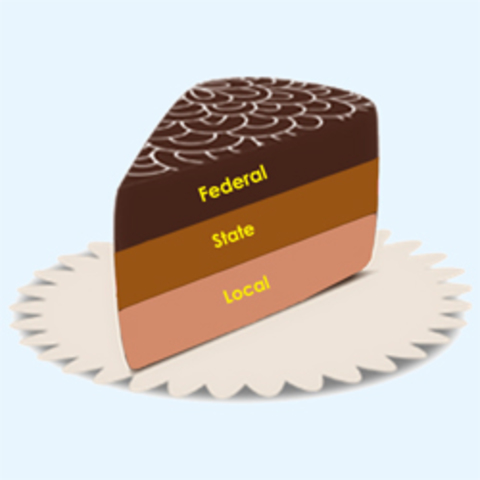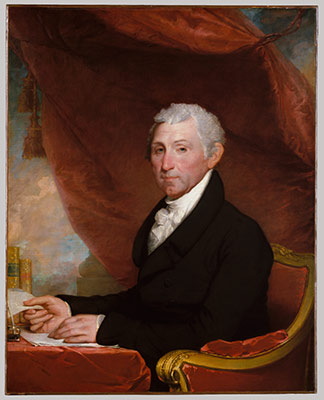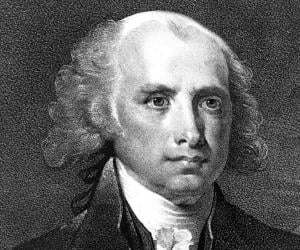On June 17, Senate votes 19-13 for a declaration of war. In addition to concern over British actions with regard to international trade, some proponents of war also endorse territorial expansion into British Canada and Spanish Florida; they also hope to end suspected British support of Indian attacks. Sends Special Message to Congress that discusses the Battle of Tippecanoe, which occurred on 11/07/1811. Madison presents his seventh annual message to Congress, advocating military streamlining, a new national bank, protective tariffs to promote industry, and internal improvements. Madison calls for a total embargo on exports and a ban on all imports of British origin, believing that Britain depends on trade with the United States. Resignation of Secretary of the Navy William Jones. The episode raised hopes for those who wanted to annex East Florida, as the United States would eventually do in 1819 with the Adams-Ons Treaty.  The Senate passes a new bank bill on December 9. Gallatin negotiates a commercial convention with Britain, further signifying the potential for the United States to play an important role in international trade and industrialization.
The Senate passes a new bank bill on December 9. Gallatin negotiates a commercial convention with Britain, further signifying the potential for the United States to play an important role in international trade and industrialization.  U.S. Supreme Courts Bank of the United States v. Deveaux decision marks the first time corporate rights are examined, granting them the right to sue the federal court. Madison sees the letter from Lord Castlereagh to British minister Foster confirming the continuance of the Orders in Council, and the President begins drafting his war message to Congress.
U.S. Supreme Courts Bank of the United States v. Deveaux decision marks the first time corporate rights are examined, granting them the right to sue the federal court. Madison sees the letter from Lord Castlereagh to British minister Foster confirming the continuance of the Orders in Council, and the President begins drafting his war message to Congress.
Signs Macons Bill Number 2 (2 stat 605), reopening American trade with Britain and France but threatening nonintercourse with both countries if American trade rights are not respected. Madison vetoes Henry Clay's Bonus Bill for internal improvements. Sends Special Message that recommends the immediate passage of a congressional embargo on all vessels in port after news arrives that American ships were sunk by France. Without the Bank of America and with an Army of only 6,700, the United States faces dire economic and military straits at the war's outset. Congress passes the embargo just days later. James Jackson of Virginia introduces a constitutional amendment in the House authorizing the establishment of a national bank, but Congress postpones consideration. With Thomas Jefferson and some Anti-Federalists, Madison soon becomes leading figure in emerging Jeffersonian Republican Party (also known as the Democratic-Republican Party). The Senate ratifies the Treaty of Ghent on February 16. Proclaims the Erskine Agreement to reestablish trade between the United States and Great Britain. Signs bill admitting the State of Louisiana to the Union (2 Stat 701). The House Committee on Foreign Relations recommends legislation to bring the Army up to full strength, establish a second regular army of 10,000, enable the President to organize 50,000 volunteers, strengthen the Navy, incorporate militia units into national service, and arm merchantmen. He sent word to President Madison that the British were marching toward Washington, D.C., and Madison and other government officials left the city for the countryside. Under the command of Andrew Jackson, 2,000 troops defeat the Creek Confederation at the Battle of Horseshoe Bend in the Tallapoosa River, eliminating the Confederation as an obstacle to American expansion toward the Gulf Coast. Without authorization, Andrew Jackson takes Spanish-held and British-occupied Pensacola, Florida, in pursuit of Creek warriors.
In Message to the Senate, nominates George W. Campbell to be Secretary of the Treasury to replace Albert Gallatin who had resigned effective that day. authorizing the President to employ a skilful assistant in the corps of engineers. After it is attacked, the U.S. battleship President fires on the British ship HMS Little Belt. Supreme Court upholds right of judicial review in Marbury v. Madison. The bill further promises to renew nonintercourse with one of the two belligerent nations if the other withdraws its decrees. The Red Sticks were slaughtered, and this resulted directly in the surge of white settlers into the territory. On August 9, Madison rescinds his proclamation establishing trade with Britain and resumes a policy of nonintercourse. Madison shares the letters of John Henry, agent for governor of Canada, with Congress, having purchased the letters the previous month for $50,000. Monroe will serve as secretary of both war and state until the end of the war. Lewis and Clark expedition sets out for the West. These orders had prevented neutral ships from trading with France. that discusses war developments and peace negotiations, Congress passes a series of laws to strengthen the military. Signs a Joint Resolution ( 3 Stat 246) authorizing the purchase of the library of Thomas Jefferson for use of the Congress. Dolley Madison saves the. American victory at the Battle of Lake Champlain, the last great naval battle of the War of 1812. Against wishes of some leading members of nascent Federalist Party, sponsors series of constitutional amendments to safeguard individual rights.
General Henry Dearborn, commanding American forces into Canada, requests that all New England governors cap the size of militias guarding their respective coasts and frontiers; Connecticut, Massachusetts, and Rhode Island refuse. He signs the bill into law on April 14. Madison nominates James Monroe as Secretary of War to replace John Armstrong. Gallatin is eventually confirmed after the Senate forces Madison to declare Gallatin's treasury cabinet post vacant.
William Henry Harrison resigns as Major General and is replaced by Andrew Jackson, against Madison's orders. Madison delivers his eighth annual address to Congress, calling for vigilance in foreign affairs, internal improvements, and the restructuring of the judiciary and executive offices. Leads opposition to Jay Treaty with Great Britain. The British, meanwhile, can now turn their complete attention to war with the United States. During the war, British and American troops clashed up and down the East Coast, from Canada down to New Orleans. Tecumseh flees to Canada and British protection. Amidst fierce intra-party competition, Madison is nominated by the Democratic-Republicans for a second term as President. As the British troops headed toward to capital, Monroe stayed to help with the city's evacuation. He urges that revision of U.S. commercial laws be undertaken.
 Then, in late September, Americans in West Florida seized control of the area, proclaimed an independent republic, and offered it to the United States. News arrives that France has sunk American ships carrying flour to British troops in Spain, leading many in Congress to call for war against France. Following news of Jackson's victory at New Orleans, the U.S. public condemns the Hartford Convention as anti-American. Congress chooses 12 of large number of proposed amendments to send to states for consideration; 10 amendments ratifiedknown as Bill of Rights. News arrives of the December 1814 Treaty of Ghent that ends the War of 1812. that wanted to incorporate the subscribers to the Bank of the United States of America because he didnt see it as reliable or sufficient. To replace the Nonintercourse Act, Congress passes Macon's Bill Number 2, which allows American ships to carry French or English goods while barring belligerent powers from American ports. On June 16, Britain revokes its Orders in Council in an attempt to avoid war with the United States, but news of the British decision will reach the United States too late. The Senate does advise and consent to the ratification of the treaty of 06/30/1815. In effort to force Great Britain to accept American demands regarding trade and impressment of American seamen into British navy, Madison persuades Jefferson to seek passage of Embargo Act, a complete ban on foreign commerce. Madison issues a proclamation authorizing occupation of West Florida, also claimed by Spain, as part of the Louisiana Purchase. 24-26 August 1814: British occupied and burned U.S. White House and Capital of Washington, D.C. January 1815: United States victorious over British at New Orleans, February 1815: Received news of Treaty of Ghent in Washington, 1816: Joined Board of Visitors of Central College, 1819: Selected as member of Board of Visitors of University of Virginia, 1826-36: Served as second rector of UVa after Jefferson's death, 1829: Last public political appearance at Virginia convention to draw up new state constitution.
Then, in late September, Americans in West Florida seized control of the area, proclaimed an independent republic, and offered it to the United States. News arrives that France has sunk American ships carrying flour to British troops in Spain, leading many in Congress to call for war against France. Following news of Jackson's victory at New Orleans, the U.S. public condemns the Hartford Convention as anti-American. Congress chooses 12 of large number of proposed amendments to send to states for consideration; 10 amendments ratifiedknown as Bill of Rights. News arrives of the December 1814 Treaty of Ghent that ends the War of 1812. that wanted to incorporate the subscribers to the Bank of the United States of America because he didnt see it as reliable or sufficient. To replace the Nonintercourse Act, Congress passes Macon's Bill Number 2, which allows American ships to carry French or English goods while barring belligerent powers from American ports. On June 16, Britain revokes its Orders in Council in an attempt to avoid war with the United States, but news of the British decision will reach the United States too late. The Senate does advise and consent to the ratification of the treaty of 06/30/1815. In effort to force Great Britain to accept American demands regarding trade and impressment of American seamen into British navy, Madison persuades Jefferson to seek passage of Embargo Act, a complete ban on foreign commerce. Madison issues a proclamation authorizing occupation of West Florida, also claimed by Spain, as part of the Louisiana Purchase. 24-26 August 1814: British occupied and burned U.S. White House and Capital of Washington, D.C. January 1815: United States victorious over British at New Orleans, February 1815: Received news of Treaty of Ghent in Washington, 1816: Joined Board of Visitors of Central College, 1819: Selected as member of Board of Visitors of University of Virginia, 1826-36: Served as second rector of UVa after Jefferson's death, 1829: Last public political appearance at Virginia convention to draw up new state constitution.  Jackson, leading 4,000 militiamen, citizens, and regular soldiers, wins a resounding victory over 6,000 British forces in the Battle of New Orleans. The electoral results indicate a divide within the nation. Vetoes the Bonus Bill for internal improvements. Washington, D.C. invaded by the British, who set fire to the White House.
Jackson, leading 4,000 militiamen, citizens, and regular soldiers, wins a resounding victory over 6,000 British forces in the Battle of New Orleans. The electoral results indicate a divide within the nation. Vetoes the Bonus Bill for internal improvements. Washington, D.C. invaded by the British, who set fire to the White House.
After four-month courtship, marries Dolley Payne Todd of Philadelphia, an attractive young widow who lost husband, John Todd, and one of their two children to yellow fever epidemic of 1793. Grants a pardon to those who deserted the war effort if they surrender themselves back to the cause. . The talks indicate that Madison has hardened his attitude toward Britain. Elected to Virginia Assembly and defends Virginia Resolutionsa rallying point for fellow Republicans. Fourth Annual State of the Union Message to Congress. Madison persuades Albert Gallatin to remain secretary of treasury in the face of strong congressional opposition and discord within Madison's cabinet. Madison determines to add Republicans to the court. Madison appoints Henry Clay, Albert Gallatin, James Bayard, Jonathan Russell, and John Quincy Adams as commissioners to negotiate directly with Britain in Gothenburg, Sweden. helps build reputation of future president Andrew Jackson.
On December 18, Madison proclaims the Battle of Tippecanoe a victory that will restore peace to the northwestern frontier. on all imported goods, intended to protect U.S. manufacturing. )
Its restrictions have intended effect, but at expense of temporarily destroying the commerce that they were trying to save. Although the President issued the proclamation in October, he did not inform Congress until his annual message in December. The British foreign secretary announces an end to the Orders in Council. Editor Gales, of the National Intelligencer, prints a summary of his discussion with Madison.
Congress votes to Declare War on Algiers, ( 3 Stat 230) resulting in deployment of the navy to the Mediterranean. During tenure as secretary of state, Madison tries to uphold American neutrality in face of transgressions against American trade by both France and England, who are again at war. Jefferson administration negotiates Louisiana Purchase from France. By Proclamation announces the U.S. occupation of West Florida as part of the Louisiana Purchase. Claiborne, governor of the Orleans territory, to take control of the area. On June 4, the House of Representatives votes 79-49 for war against Britain. The Bank of the United States closes. , which is used to prepare for war with Great Britain. No other states join opposition. In February 1811, he declares a halt in trade with Britain unless the Orders are repealed.
These negotiations are later transferred to Ghent, Belgium. Madison calls a special session of Congress to convene November 4 in preparation for war against Britain. Congress has limited the bill, however, by authorizing troops to serve only in their home states with the consent of state governors. John Adams elected president; Thomas Jefferson, vice president. Member of the Continental Congress. Madison reestablishes nonintercourse with Britain. Algiers surrenders on June 30. Signs bill allowing the president to call up 40,000 state troops (3 Stat 193), but Congress limits this by authorizing troops to serve only in their home states. After the unsuccessful British offensive, Francis Scott Key pens The Star-Spangled Banner.. Madison and his cabinet decide to continue with the attempted invasion of Canada. News of the Treaty will reach the United States in February 1815. Harrison's militia is barely successful at the Battle of Tippecanoe, an engagement that serves as a prelude to the War of 1812. John Armstrong of New York replaces William Eustis as secretary of war. These essays, published in newspapers and bound editions, argue for ratifying new Constitution. Senators had objected to Gallatin holding both offices. Madison signs a bill allowing the President to call up 40,000 state troops. Sends Special Session Message that discusses war developments and peace negotiations that occurred on 04/21/1813. The city had been evacuated before the British arrived with President James Madison and his administration leaving the capital city to flee the invading soldiers. Nominates James Monroe as Secretary of War. In Special Message, transmits British offer to Congress, while stressing that vigorous preparations for carrying on the war can in no respect impede the progress to a favorable result . The report recommends that states negotiate arrangements with the federal government for their defense, and proposes constitutional amendments to protect the region's increasingly minority status in the Union. Treasury Secretary Gallatin urges Congress to extend its charter but fails to convince members concerned with the large British interest in the Bank. Proclamation--Granting Pardon to All Deserters Who Return to Duty. Vetoes a Relief bill, stating it is unconstitutional because it favors a religious establishment. The United States also won significant battles against Native Americans in Ontario and the Mississippi Territory. British ships raided American ports from Georgia to Maine. Using name "Publius," Alexander Hamilton, John Jay, and Madison co-author The Federalist. The war began after President Madison requested a declaration of war from Congress to protect American ships on the open seas and to try to stop the British practice of impressments, the seizure of U.S. sailors for service in Britain's Navy. Approves Congress' enactment of the first tariff (3 Stat 310) on all imported goods, intended to protect U.S. manufacturing. Massachusetts legislature passed resolution calling for a gathering of the New England states to deliberate further actions and resentments against the government specifically lack of federal aid and the overall increasing burden of the war on these states that greatly opposed it yet made up the bulk of the defense. The northwest ceases to play a role in war strategy. Madison vetoes two bills of Congress, one granting land in the Mississippi Territory to a Baptist congregation and the other incorporating an Episcopal church in Washington, D.C. Madison argues that both bills violate the non-establishment clause of the First Amendment. The treaty, negotiated by Chief Justice John Jay, attempted to settle disputes, including continued British military presence in the northwestern U. S. territory, trade in the West Indies and the seizure of goods and men from American vessels.



